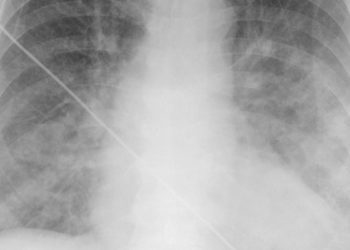Heart failure readmission prevention program may have inadvertent consequences
1. In this interrupted time-series and survival analysis, rates of readmission after heart failure hospitalization decreased significantly after the implementation of the Hospital Readmission Reduction program (HRRP) with public reporting and financial penalties.
2. This study also found, however, significantly increased 30-day and 1-year all-cause mortality rates over the same time period after the implementation of the HRRP, highlighting potential unintended consequences of the program.
Evidence Rating Level: 2 (Good)
Study Rundown: Readmission rate after heart failure hospitalization is a metric used in determining quality of health care. There are been many aims to reduce these readmission rates. The Hospital Readmission Reduction Program (HRRP) involved public reporting of 30-day risk-standardized readmission rates and created financial penalties for hospitals with higher readmissions. While readmissions rates went down after implementation of public reporting and financial penalties, it is unclear if there are inadvertent consequences as a result of these same strategies. This study aimed to examine the association of the HRRP with temporal trends in readmission and mortality rates among fee-for-service Medicare beneficiaries hospitalized with heart failure.
The 30-day risk-adjusted readmission rate declined significantly from 20.0% in March 2010, before implementation of the HRRP to 18.4% in 2012-2014 HRRP penalties phase. However, 30-day risk-adjusted mortality rates increased significantly from 7.2% before HRRP implementation to 8.6% in the HRRP penalties phase. These patterns were also seen in the 1-year risk-adjusted rates. Strengths of this study include its use of a large prospectively gathered clinical registry however given it’s observational design cause and effect among the HRRP implementation and readmission reduction and mortality rates cannot be established.
Click to read the study, published in JAMA Cardiology
Relevant Reading: Association of Changing Hospital Readmission Rates With Mortality Rates After Hospital Discharge
In-Depth [time-series analysis]: This interrupted time-series and survival analysis of prospectively collected clinical data from the American Heart Association Get With The Guidelines-Heart Failure registry was conducted from January 2006 to December 2014. The clinical registry data included readmission and mortality information on fee-for-service Medicare beneficiaries who were hospitalized with heart failure across 416 US hospitals. The exposure of interest was the HRRP, specifically analyzed using time intervals related to HRRP implementation: before (January 2006 to March 2010), during (April 2010 to September 2012) and after HRRP penalties were implemented (October 2012 to December 2014). Outcome of interest was risk-adjusted 30-day and 1-year all-cause readmission and mortality rates. Statistical analysis included linear and Cox proportional hazards regression.
There were 115 245 patients included in this analysis where the mean (SD) age was 80.5 (8.4) years. The 30-day risk adjusted readmission rate declined significantly from before the HRRP was implemented to the HRRP penalties phase: 20.0% to 18.4% (HR after vs. before implementation 0.91; 95% CI 0.87-0.95; p < 0.001). However, 30-day risk-adjusted mortality rates increased from before the HRRP implementation to after: 7.2% to 8.6% (HR after vs. before 1.18; 95% CI 1.10-1.27; p < 0.001). The 1-year readmission and mortality rates also showed similar significant overall patterns.
Image: PD
©2017 2 Minute Medicine, Inc. All rights reserved. No works may be reproduced without expressed written consent from 2 Minute Medicine, Inc. Inquire about licensing here. No article should be construed as medical advice and is not intended as such by the authors or by 2 Minute Medicine, Inc.







